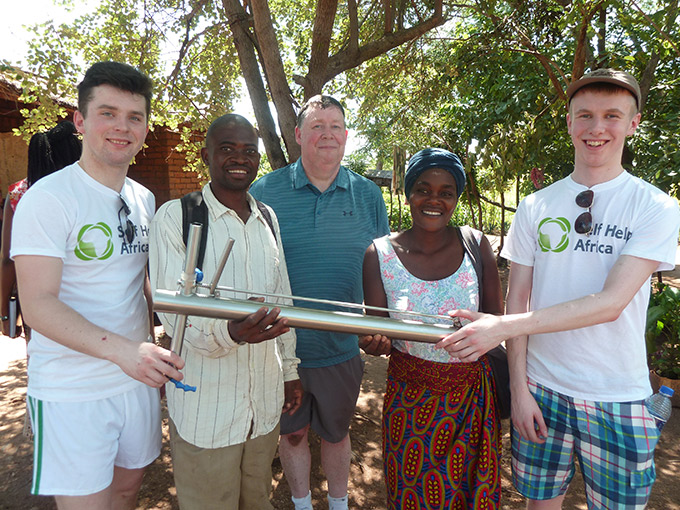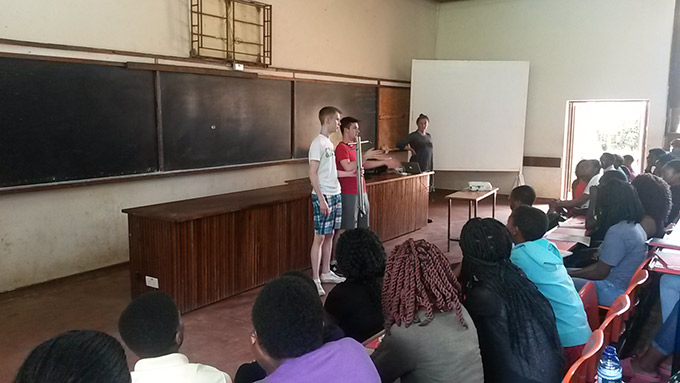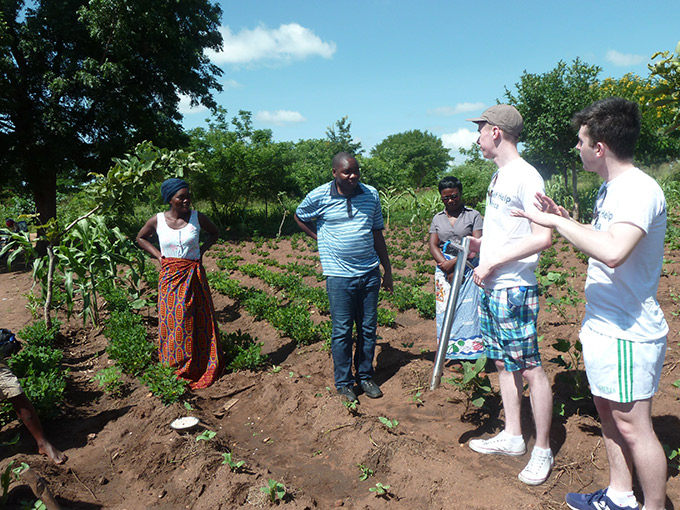Winners of Irish Aid’s BT Young Scientist award field test their project in rural Malawi
News
06 March 2018
Diarmuid Curtin (left), teacher Donal Enright (center) and Jack O'Connor (right) with farmers Memory Pemba and Alick Bamusse in Kwitanda village, Balaka. Credit: Gorta Self Help Africa
Two Limerick teenagers who won the Irish Aid sponsored prize at last year’s BT Young Scientist Exhibition, got the chance to field test their winning invention, on a recent study visit to Africa with development agency Gorta-Self Help Africa.
As winners of the Irish Aid sponsored ‘Science for Development Award’ at the student science fair, Diarmuid Curtin, Jack O’Connor and their teacher Donal Enright won a travel bursary from Irish Aid to travel to Malawi on the annual schools’ trip, organised by the Development Education unit of Gorta-Self Help Africa.
The visit was an opportunity for the former students of Desmond College in Newcastle West to field test their project – a custom-made seed planter for farmers.

Diarmuid Curtin (right) and Jack O'Connor (left) presenting their award-winning ergonomic seed planter to students at Lilongwe University of Agriculture and Natural Resources, Malawi. Credit: Gorta Self Help Africa
Travelling to Lilongwe, the capital city of Malawi, and on to the Balaka district in the southern part of the sub-Saharan country, Diarmuid and Jack demonstrated their planter to farmer groups supported by Gorta-Self Help Africa, gave a presentation to students at one of Malawi’s leading agriculture science colleges, and also met with the Irish Ambassador to Malawi, Mr. Gerry Cunningham.
“The Science for Development Award – which is organized each year by Irish Aid and Gorta-Self Help Africa – rewards the BT Young Scientists project that best addresses a challenge or issue faced by communities in the Global South. The trip to Malawi gave the winners a chance to investigate how, in practice, their science project might have a positive impact on the lives of people in rural Africa,” explained Dorothy Jacob, coordinator of Gorta-Self Help Africa’s Development Education programme.
“We visited farmers that are being trained on conservation agriculture,” recalls Diarmuid Curtin. “We got the opportunity to demonstrate our device to them and hear their views on it.”
The students’ metal planter - designed to save time, labour, and bring precision to seed planting – was well received in the farming communities visited.
“We were a bit anxious as to how farmers would react to our device, as it is a cultural shift comparing to their traditional methods of planting seeds. We were surprised to see how accepting they were and were delighted to get their opinions,” explained Diarmuid Curtin.
“One of the most practical things that we heard was that the metal used wouldn’t be locally available or affordable, and that bamboo or plastic would be more easy for them to work with, It would make the device cheaper and easier for them to maintain”, added Jack O’Connor.

Diarmuid Curtin (right) and Jack O'Connor (left) field test their device on a field with local farmers, Kwitanda village, Balaka district, Malawi. Credit: Gorta Self Help Africa
On the final day of their week-long visit the Limerick students presented their invention to students at one of Malawi’s biggest farm training colleges, the Lilongwe University of Agriculture and Natural Resources.
“It was a little scary at first to stand up in front of these students who are studying agriculture in Malawi. The group were every enthusiastic about our project however, and they really showed us what we could achieve with the planter. It was useful to have their opinion from an agricultural and engineering point of view,” explained Jack O’Connor.
In addition to testing their award-winning device and getting feedback from people in the field, the aim of the trip was to give the Irish students a chance to see Africa at first hand, and learn more about the challenges that people face in their daily lives, explained Dorothy Jacob. “It’s about both deepening understandings and challenging preconceptions,” she said.
“I was amazed by how innovative farmers are in Malawi. We visited groups that grafted fruit trees, others that were using intercropping to restore the soil. Trade also is developing; farmers are shifting from just feeding themselves to selling a surplus of crops,” commented Jack O’Connor.
“I was blown away by their strong sense of community. People have been so welcoming along the way. Malawi definitely lives up to its name of warm heart of Africa!” added Diarmuid Curtin.
The end of the trip was just a beginning for the two students who are planning to work on a new model for the planter, drawing from their experience in Malawi. Eventually, the pair has the ambition to see the device used in the field in the next few years. “We made great contacts through the Irish Embassy, the university and Gorta-Self Help Africa staff. Once we get back to Ireland, we’ll get the conversation going and see where it takes us!” concluded Jack O’Connor.

